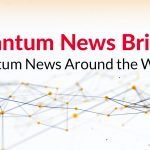IBM unveils Osprey, partnerships with Bosch, Vodafone, more at Quantum Summit

Bunches of big news out of the IBM Quantum Summit today: The company announced its latest QPU, updates to IBM Quantum System Two (which we’ll address in a separate story), and new, far-reaching partnerships with Germany’s Bosch and U.K. telecom giant Vodafone Group (both discussed below).
The newest addition to the IBM quantum family is the 433-qubit Osprey processor, which features more than three times the qubits of the 127-qubit Eagle processor announced last year. The Osprey’s landing is not a total surprise, as IBM has been talking about its expected 2022 unveiling since last year, and has done a very good job over the years keeping to its well-publicized QPU roadmap schedule.
Meanwhile, the Bosch pairing is part of a broader effort by Bosch to invest more than €10 billion in digitalization and connectivity technologies by 2025. Part of Bosch’s goal in partnering with IBM involves an effort “to use quantum computing simulation of materials to find surrogates for the precious metals and rare earths in carbon-neutral powertrains – in the electric motor and the fuel cell – in the next ten years,” according to a Bosch statement.
Bosch already has been very active in quantum, partnering with the likes of Multiverse Computing, investing in IonQ early on, and establishing a quantum sensors division, among other moves.
Bosch and Vodafone also are among the newest members of the IBM Quantum network, according to IBM.
As for Vodafone, the international telecom player has aligned with IBM for a collaboration under which Vodafone will work with IBM on quantum-safe cybersecurity, as well as explore quantum computing use cases for telcos.
Regarding security, Vodafone will investigate how to apply IBM Quantum Safe cryptography technology across its entire and diverse network infrastructure and systems, the companies said. The new partnership comes barely a month after Vodafone and IBM teamed with the GSMA telecom industry trade group to create a new task force to promote evaluation and adoption of post-quantum cryptography across the telecom network operator sector.
Meanwhile, joining the IBM Quantum Network will provide Vodafone with cloud access to IBM’s quantum computing systems and related expertise as the companies work together to develop, validate, and advance potential quantum use cases in telecom. Vodafone also will have the opportunity to further its employees’ skills in quantum technology through iterative prototyping led by IBM, and to actively recruit quantum computing experts to build its own quantum team.
While some telcos, such as BT and SK Telecom, have been early experimenters with quantum technology–mainly in the form of quantum key distribution between network nodes–not many other telcos have been so quick to explore quantum’s potential. The sector as a whole certainly has not been as aggressive as industries like banking and aerospace in exploring quantum use cases and quantum-safe security.
“Partnering with IBM provides us with access to quantum technology which has the potential to provide incredible network optimization,” said Luke Ibbetson, head of group R&D at Vodafone Group. “It’s the sort of innovation that existing computers will never achieve alone, allowing us to save energy, reduce costs and give customers great connectivity in more places. Investing in quantum-safe cryptography, now, also gives us the peace of mind that our infrastructure and customer data will also always be secure as we explore the benefits of quantum computing.”
Dan O’Shea has covered telecommunications and related topics including semiconductors, sensors, retail systems, digital payments and quantum computing/technology for over 25 years.























